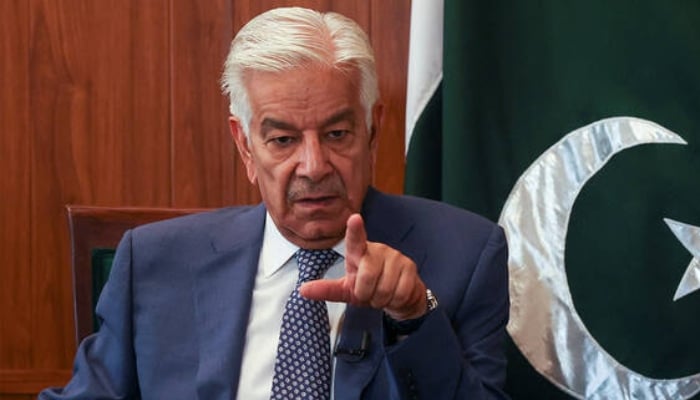
Defence Minister Khawaja Asif on Tuesday revealed that the government was still discussing the plan to send troops to Gaza to join the proposed international stabilisation force under US President Donald Trump’s peace initiative.
“This thing has to be finalised [and] it is in process. The government will take a decision after passing through the process, and I don’t want to preempt it,” he said during an interview on Geo News’ Aaj Shahzeb Khanzada Kay Sath.
The defence czar, however, said that the government will take the parliament and all institutions into confidence before making a decision about the same.
The deployment of an international peace force in Gaza was part of Trump’s plan to help secure a fragile ceasefire, which began this month, halting two years of war between Israel and the Palestinian resistance group Hamas.
A day ago, Israel said that it wouldn’t accept the presence of Turkish armed forces in Gaza under a US plan to end the war in the Palestinian territory for good.
Israeli Foreign Minister Gideon Saar said that Israel has not surrendered its right to self-defence as part of the agreement brokered by Washington, Egypt, and Qatar.
Saar’s statement came after Israeli Prime Minister Benjamin Netanyahu said that Tel Aviv would decide which foreign forces to allow in Gaza.
But it remains unclear whether Arab and other states will be ready to commit troops to the international force.
While the Trump administration has ruled out sending US soldiers into the Gaza Strip, it has been speaking to Indonesia, the United Arab Emirates, Egypt, Qatar, Turkey, and Azerbaijan to contribute to the multinational force.
Earlier in the day, the Ministry of Information and Broadcasting categorically rejected the “fake and misleading news” of the Indian media outlets, claiming the deployment of 20,000 Pakistani troops for the Gaza peace force.
Pakistan has never recognised Israel and always maintained a clear, principled stance in support of Palestinian self-determination, said the ministry.
It also clarified that neither the Foreign Office nor the military’s media wing, Inter-Services Public Relations (ISPR), ever supported or announced any Pakistani mission in Gaza.
‘Elements in Kabul behind stalemate in Pak-Afghan talks’
Asif blamed elements in Kabul for the stalemate in Pakistan’s negotiations with the Afghan Taliban regime, saying that the Afghan delegation was “powerless and helpless”.
Delegations from Pakistan and Afghanistan are currently in Istanbul, Turkiye, for the second round of peace negotiations, following the week-long border clashes.
“Their [Taliban’s] control over Afghanistan is weak. Whenever we neared an agreement, there was some sort of intervention from Kabul that resulted in the suspension of talks,” said the defence minister.
Asif said that he had sensed the problem on the Afghan delegation’s part during the first round of talks in Doha, Qatar, in which he led the Pakistani delegation.
His comments come as the Pakistani delegation and mediator Turkiye intensified their effort to come to an agreement with the Taliban delegation on the issue of cross-border terrorism.
Sources had said that the dialogues in the second round of talks — which began on October 25 — were moving towards the final round.
However, they said that the Afghan side kept changing its stance after receiving instructions from Kabul each time, leaving the negotiations in jeopardy.
Speaking during today’s show, the defence minister said that Pakistan participated in the negotiations to contribute to regional peace, asserting that responsibility for any collapse of the talks would lie entirely with the Taliban regime.
Asif said that Pakistan joined the negotiations with an aim for peace in the region, asserting that the responsibility for any collapse of the talks would lie solely on the Taliban regime.
Asif advised caution against believing “verbal promises” made by a group, instead of a policy by a uniform government.
“How can we believe somebody who is hosting the TTP, who is responsible for the martyrdom of our 4,000 children?” he asked.
The defence minister added that the Taliban delegation was powerless, saying that real power rested in Kabul, which was penetrated by India.
“There should be no doubt that India has started a proxy war against Pakistan using Kabul,” he added.
India wants to compensate for the humiliating defeat it faced during the May conflict, he said, adding that “there were elements in Afghanistan who have pledged loyalty to India”.
Asif revealed that the Taliban delegation backed down from the agreement with the Pakistani delegation five times after receiving instructions from Kabul.
“They [Taliban delegation] would express their helplessness when they return. I have all the sympathies with that delegation,” he said.
Those pulling the strings from Kabul were being controlled from New Delhi, he added.
Asif was of the view that India planned to engage “Pakistan in a low-intensity war”, saying that the plan was being executed by Kabul.
Responding to Afghan media reports that the Taliban would target Islamabad in case of another clash, the minister said, “If anyone dares cast an eye toward Islamabad, we will take their eyes out”.







